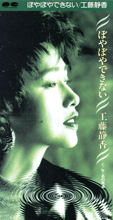Boya Boya Dekinai
"Boya Boya Dekinai" (ぼやぼやできない, lit. "Can't Be Careless") is a song recorded by Japanese singer Shizuka Kudo for her sixth studio album, Mind Universe. It was released by Pony Canyon as the album's lead single on January 23, 1991.
| "Boya Boya Dekinai" | ||||
|---|---|---|---|---|
 | ||||
| Single by Shizuka Kudo | ||||
| from the album Mind Universe | ||||
| Released | January 23, 1991 | |||
| Genre | ||||
| Length | 3:41 | |||
| Label | Pony Canyon | |||
| Songwriter(s) | ||||
| Producer(s) |
| |||
| Shizuka Kudo singles chronology | ||||
| ||||
| Audio sample | ||||
| ||||
Background
"Boya Boya Dekinai" is a humorous mid-tempo song influenced by the sounds of Motown.[1] The song was written by Gorō Matsui and Tsugutoshi Gotō and produced by the latter. Gotō, who first made his mark as a bassist, was praised for crafting an especially rhythmic tune.[1] Lyrically, the song describes a woman trying to forget a past lover and lamenting the fact she can't be careless with her time anymore if she's to find a lasting relationship.
The B-side for the single, "Ano Sakamichi", was co-written by Kudo, under the pseudonym Aeri, and is a heartfelt ballad dedicated to her older brother, who died in a motorbike accident. While promoting the single, Kudo stated in an interview that she found herself crying in the middle of recording the song.
Chart performance
The song debuted at number two on the Oricon Singles Chart with 99,000 copies sold in its first week, becoming Kudo's first single not to reach the top of the chart since "Daite Kuretara Ii no ni".[2] The single spent a second week at number two, blocked by Kan's "Ai wa Katsu".[3] "Boya Boya Dekinai" stayed on the chart for a total of 13 weeks. It ranked at number 37 on the year-end Oricon Singles Chart.[4]
Track listing
All music is composed by Tsugutoshi Gotō.
| No. | Title | Lyrics | Arranger(s) | Length |
|---|---|---|---|---|
| 1. | "Boya Boya Dekinai" (ぼやぼやできない, "Can't Be Careless") |
| 3:41 | |
| 2. | "Ano Sakamichi" (あの |
| 4:23 | |
| Total length: | 8:04 | |||
Charts
| Chart (1991) | Peak position |
|---|---|
| Japan Weekly Singles (Oricon)[5] | 2 |
| Japan Monthly Singles (Oricon)[6] | 3 |
| Japan Yearly Singles (Oricon)[4] | 37 |
Certification
| Region | Certification | Certified units/sales |
|---|---|---|
| Japan (RIAJ)[7] | Gold | 324,000[8] |
|
*sales figures based on certification alone | ||
References
- "工藤静香 / Shizuka Kudo 20th Anniversary the Best [2CD]". CDJournal. Retrieved December 16, 2017.
- "1991年2月4日付 CDシングル/アルバムランキング". Retrieved December 16, 2017.
- "1991年2月11日付 CDシングル/アルバムランキング". Archived from the original on 2016-03-04. Retrieved December 16, 2017.
- "オリコン 1991年TOP100". Archived from the original on November 15, 2017. Retrieved December 16, 2017.
- "ぼやぼやできない 工藤静香". Oricon. Retrieved December 16, 2017.
- "オリコン(oricon)「1991年02月」の月間シングルCDランキング". Retrieved January 18, 2018.
- ゴールドディスク認定 [Gold Disc Certifications] (in Japanese). Recording Industry Association of Japan. February 1991. Retrieved December 18, 2017.
Select 1991年2月 on the drop-down menu
- "工藤静香 - アーティスト別シングル売上補完". @wiki. Retrieved December 20, 2017.